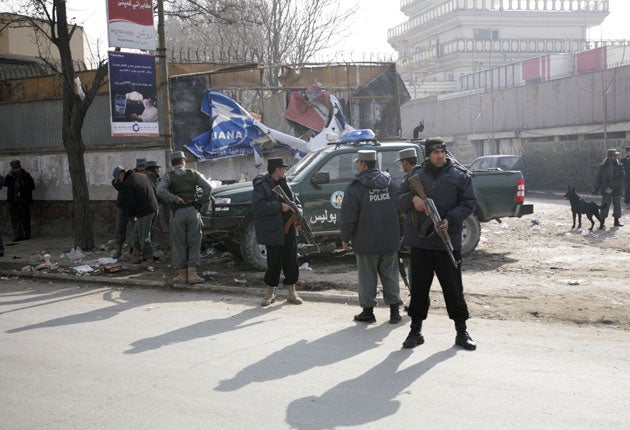Afghanistan: The hokey-cokey strategy
On eve of Obama's surge, Brown aims to convince voters he has a plan for withdrawal. Handover 'could begin by end of 2010' – but PM is set to commit 500 more troops

British troops will begin handing over control of Helmand province to Afghan forces by the end of next year, Gordon Brown claimed yesterday as he set out plans for a withdrawal from Afghanistan after years of bloody fighting and the deaths of 235 British soldiers.
On the eve of President Barack Obama's expected announcement of a deployment of up to 35,000 extra US troops, the Prime Minister laid out a series of milestones for the Kabul government to meet before Britain's commitment can end.
It follows intense public pressure on Mr Brown to scale back Britain's commitment to what many see as an unwinnable and ill-judged war. A poll for The Independent on Sunday earlier this month showed seven out of ten people wanted British troops out of Afghanistan within a year or so.
The announcement enables the Labour leader to go into a spring general election claiming that "Afghanisation" is under way in the country, and that within the year the number of British troops can fall. Yet, with corruption rife and troops engaged in bloody battles with Taliban fighters, such a timetable must be in doubt.
A conference hosted by Mr Brown in London in January will bring together the Afghan president, Hamid Karzai, the UN Secretary-General, Ban Ki-moon, and the US Secretary of State, Hillary Clinton, with leaders of Afghanistan's neighbouring countries to map out the political and military strategy for 2010.
Mr Brown will confirm to the Commons as early as tomorrow that Britain's commitment will increase by 500, to 9,500, in Helmand as part of the US-led surge. Yet it will mark the start of a countdown to a lengthy withdrawal from Afghanistan.
On Tuesday evening, in a speech at the US military academy at West Point, President Obama will put a figure on the increased troop commitment after weeks of deliberations with advisers.
He will explain how the US will extract itself from an increasingly unpopular eight-year war in which 930 American soldiers have died, and to which there is no apparent end in sight.
Standing next to the UN Secretary-General at the Commonwealth heads of government meeting in Trinidad and Tobago yesterday, the Prime Minister insisted he was not setting a timetable for British troops.
But he added: "As we build up the Afghan army from 90,000 to 134,000, and perhaps at a higher level, build up the police from 90,000 to be even stronger and far more effective, there will come a point at which we can transfer more and more districts and more and more provinces to Afghan security control. It's at that point that we would look at what was the need for British troops if the Afghanistan people were able to be responsible for their own security, but not until then."
The key milestones, to be launched at the London summit on 28 January, are: within three months, Kabul to have identified additional Afghan troops to send to Helmand for training; within six months, President Karzai to have a "clear plan" for police training, including dealing with corruption; within nine months, 400 provincial and district governors to be appointed and have control over those areas, including two districts in Helmand; within one year, 5,000 additional Afghan troops to have been trained in Helmand, with the Afghan army increased by nearly 50,000 nationally; also, at least five out of 34 provinces to be under Afghan control.
In a sign that President Karzai is responding to pressure to restore credibility to Afghan security forces, his government announced a pay rise of nearly 40 per cent for police and military recruits. The Interior Minister, Hanif Atmar, said monthly salaries would increase by $45 to about $165 for a new recruit. At present, there are about 95,000 Afghan soldiers and 93,000 police.
Mr Brown said: "My duty to the British people, which is to ensure the security of people against terrorism coming to the streets of Britain, is best discharged by making sure that Afghanistan itself is increasingly able to run its own affairs, so that it will never again provide space for al-Qa'ida. I have set no timetable and will set no timetable about troop numbers, but what I will say is that we are creating milestones and benchmarks by which the process of Afghanisation can be judged."
Mr Brown added: "Britain and the world need protection from the terrorism that starts in the Afghan-Pakistan area, which is the epicentre of modern global terrorism and has got to be dealt with."
Members of the 43-nation coalition in Afghanistan will be represented in London. The conference will be opened by Mr Brown and chaired by Foreign Secretary, David Miliband.
Mr Ban, who spoke to President Karzai by telephone before arriving in Trinidad, said the Afghans needed to take a "lead role" in "shaping their destiny". A follow-up conference will take place in Kabul. Mr Ban said: "These conferences would thus constitute defining words in the reconfiguration of the relationship between Afghanistan and the international community."
President Obama's speech will be followed by two days of joint testimony on Capitol Hill by Robert Gates, the Defence Secretary, and Mrs Clinton. No details of the US exit strategy have emerged, but White House officials have indicated that "in eight or nine years" the US will no longer be involved.
Join our commenting forum
Join thought-provoking conversations, follow other Independent readers and see their replies
Comments
Bookmark popover
Removed from bookmarks